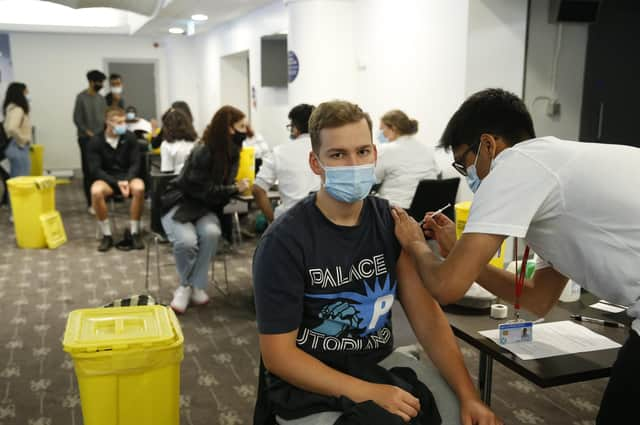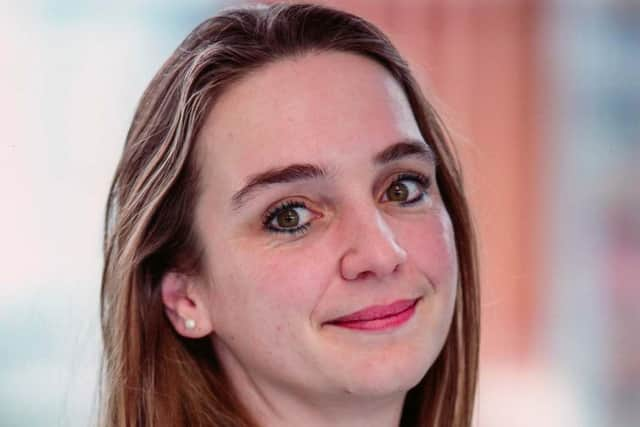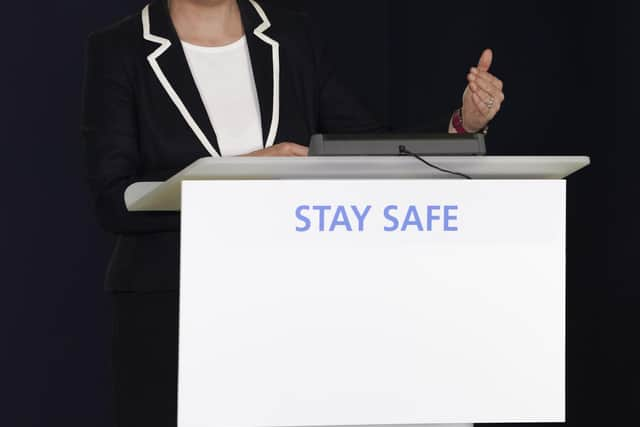The Long Covid timebomb: We could soon have 10,000 new cases a day


The professor of paediatric infectious diseases at Edinburgh University’s Centre for Inflammation Research is one of around one million people in the UK suffering from Long Covid: a condition which can cause debilitating respiratory, cardiological and neurological symptoms. Fifteen months after contracting the virus, she is still reliant on immunosuppressants.
So she finds it hard to understand why the risk of Long Covid does not appear to be factored into the UK government’s decisions over the lifting of restrictions. “It can’t be lack of knowledge any more,” she says. “We have solid figures from the Office of National Statistics (ONS), there is money being spent on research. So why isn’t it part of the narrative?"
Advertisement
Hide AdAdvertisement
Hide AdIt’s a question being asked by many experts. Last week - as Johnson trumpeted July 19 as Freedom Day in England - more than 100 experts warned him he was moving too quickly.


In Scotland, of course, Nicola Sturgeon is being more cautious. There is no talk of Freedom Day. But it would be naive to think that opening up elsewhere would have no impact on those of us living north of the border, as people travel back and forth, or that Johnson’s decision would not increase pressure on the First Minister to move faster than she would wish.
New Health Secretary Sajid Javid insists that - with 33m people in the UK now fully vaccinated - we have to “learn to live” with the virus.
He has consistently pointed to falling death rates as evidence the vaccine programme is working.
But the number of cases is rising. In the UK last week, the daily total topped 30,000 for the first time since January. Scotland's infection rate is the highest in the UK. On Friday, the Scottish government announced six deaths in the previous 24 hours. The number of people in hospital was up 26 to 427, with 39 patients in intensive care, while the number of under-19s in hospital stood at 42 - a record high.


These figures are alarming enough but deaths and hospital admissions are not the whole story. At an emergency summit convened on Thursday, Richard Horton, editor-in-chief of the Lancet, urged the government to "pause to look at Long Covid”.
“It’s important to remember young people are more likely to become sick than to die of Covid 19. As many as one in 20 to one in 10 people have ongoing symptoms three months after a positive Covid test,” he said. “And if we reach 100,000 new infections a day, as Sajid Javid has predicted, that means 10,000 people every day with Long Covid.
Horton said Long Covid disproportionately affected those in the most socially and economically deprived parts of the country and those with existing disabilities. "The medium to long-term impact of Covid 19 is being seriously underestimated by counting only deaths," he said.
Advertisement
Hide AdAdvertisement
Hide AdHe insisted mask wearing and physical distancing should stay in place until at least 70% of the population had been fully vaccinated - a goal no country has yet achieved. The UK is currently at 51%. There is some evidence the level of take-up is falling amongst the young, and - controversially - in the UK there is no plan, as yet, to offer the vaccine to the under-18s. This is in contrast to the US and other European countries.


In the UK, there is still a fierce debate over the risk/benefit ratio of vaccinating children. That ratio is different for children because they are much less likely to die or be hospitalised. But critics say once again the impact of Long Covid is not being taken into account.
The proportion of children who suffer from Long Covid is lower than the proportion of adults: estimates put it at seven or eight per cent. But that’s still a significant number - and its impact can be brutal.
“Anna was a happy, healthy, hilarious little girl and now she is exhausted, depressed, anxious and unable to go to school,” her mum Helen Goss, tells me. “She hasn’t seen her friends in months. She used to go horse riding, have piano lessons, go swimming, but she can’t do any hobbies any more. We’ve tried, but it always fails.”
Anna, from Westhill, Aberdeenshire, caught Covid back in April 2020. Her symptoms were initially mild, but then - three weeks later - she got very sick with some sort of inflammatory response. “It was horrifying,” says Goss, who is the Scottish spokesperson for Long Covid Kids. “She was limp, unresponsive, she couldn’t walk unaided, couldn’t eat or drink, wasn’t going to the toilet. There was one point I couldn’t wake her up. Even thinking about it now is traumatic.”


Her GP saw her multiple times, but it was her primary school which referred her to a paediatrician. That paediatrician has diagnosed chronic fatigue syndrome and Paediatric Acute-onset Neuropsychiatric Syndrome (PANS), likely caused by Covid. They can go no further than “likely” because back in April there was no community testing for the virus.
Symptoms of PANS include anxiety, depression, tics, personality change and a decline in school performance. In more than 80% of cases, there is evidence of an abnormal autoimmune or inflammatory response in the brain following an infection.
Goss is among those campaigning for better treatment facilities for Long Covid patients. At the moment in Scotland, adults and children alike will be seen by their GP, then referred on to a range of different specialists - cardiologists, pulmonologists, physiotherapists - according to their symptoms. In England, there is now a network of specialist Long Covid clinics.The NHS is also setting up 15 new paediatric hubs. But the Scottish government has taken a different approach.
Advertisement
Hide AdAdvertisement
Hide AdIn response to a letter from Tory MP for West Aberdeenshire and Kincardine , Andrew Bowie, Lynne Nicol, Deputy Director, Healthcare Quality and Improvement, wrote: “ Each [health] board is working to co-ordinate existing pathways across primary, community and secondary care services to support a coherent patient journey for people with Long Covid.
“Whilst Long Covid clinics are one model that NHS Boards may explore, we know no one single approach is likely to fit all areas and circumstances. Lastly, we are committed to improving our understanding of what is still a relatively new illness, in order to inform the care and support provided by our NHS.”
Goss and Bogaert also believe vaccines should be offered to children over the age of 12. “The Medicines and Healthcare products Regulatory Agency (MHRA) has approved the Pfizer vaccine for 12-17 year olds in the UK,” Goss says. “The US has vaccinated nine million 12-17-year-olds over the last 3 months. As it stands, children and young people remain unprotected from a novel virus that we still know very little about.”
The debate over vaccines is likely to intensify as under-18s prepare to return to classrooms and lecture halls after the summer, particularly if transmission rates continue to be high.
There have already been calls for Freshers’ Weeks to be cancelled. But the campaign group UsForThem has also been putting pressure on the Scottish government to relax self-isolation rules for school pupils in line with England.
Yesterday, a Scottish government spokesperson said: “We are providing the vaccine to people on a priority basis as set out by the independent expert clinicians and scientists on the Joint Committee on Vaccination and Immunisation (JCVI).
“Current JCVI advice does not cover vaccination in those under 18 years old. So far only 16 and 17 years olds in groups 1-9 are covered. Clinical trials are currently underway for vaccination of children and young people, and the JCVI is currently reviewing vaccinations for 12-15-year-olds.
“We will continue to engage with vaccine developers and the JCVI and will take their advice into consideration.”
Advertisement
Hide AdAdvertisement
Hide AdBut the UK is increasingly an outlier. Bogaert is currently visiting family in the Netherlands. “My [school age] nephews and nieces have all been offered the vaccine and I think that’s right,” she says. “In the UK, we force children to go to school, but we don’t allow them the protection of a vaccine if they want. I don’t think that’s ethical. “
Like Bogaert, Lesley Macniven, who is the employment group chair of Long Covid Support, was one of the first tranche of patients to develop the condition. She is feeling better than she did when we last spoke back in October. “ I am not having chest pains though I still need Beta blockers to go up hills.”
Macniven says many of the “first wavers” are gradually improving, though still suffering relapses, “but we are seeing new themes and trends emerging in second wavers. The concern now is we are going to be seeing third wavers 12 weeks down the line as the infection rates rise. “
The support group is also seeing children with Long Covid. “This is becoming a bigger issue, tied in with where we are now as regards restrictions,” Macniven says. “From our perspective it seems [the UK government] wants to experiment with young, healthy members of the population including children and - as [Labour leader] Keir Starmer has said - that seems reckless.
“We haven’t found a way to support adults who have it for the last year, so how are we going to support children? It could be that some of them will be disabled for life - we just don’t know. “
Bogaert says the majority of young people are not picking up the message that they need to be careful because they might get Long Covid. “On social media you see people saying ‘it’s all in the mind’ or that Long Covid just means people are ‘a bit tired’,” she says. “I don’t think that narrative has been countered by public health or our governments.”
Macniven, who has been lobbying for more support to help Long Covid sufferers get back to work, says Sturgeon struck a welcome note of caution in last week’s briefing, but is critical of other aspects of the Scottish government’s approach.
She too is frustrated by the lack of movement on Long Covid clinics and by the fact a new study - led by Glasgow University - is only questioning sufferers who had a positive test. “It excludes many of us who developed the symptoms early on,” she says. “It excludes people who have been ill for the longest and who have never had any support because they were in the first wave. We are suffering disadvantage upon disadvantage.”
Advertisement
Hide AdAdvertisement
Hide AdShe hopes a summit being held next Friday by the Long Covid Support Group, Chest Heart and Stroke Scotland and the Health and Social Care Alliance Scotland, and involving patients, medical professionals, politicians and third sector organisations, will serve as a catalyst to fresh momentum.
“I hope it will lead to real progress,” she says. “There are many thousands of people in Scotland who are still wondering when they are going to get effective treatment.”
She is one of those people. “You ask me how I am,” she says. “I am living half a life and that’s Ok, I accept that. But at some point I would love to be able to go on holiday with my kids. Just now, they look at me and say: ‘Mum, why can’t you do this?’ I reply: ‘Good question. I wish I knew the answer.’”